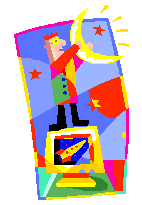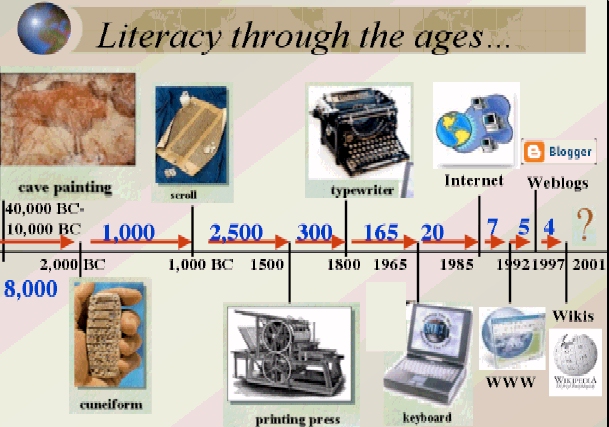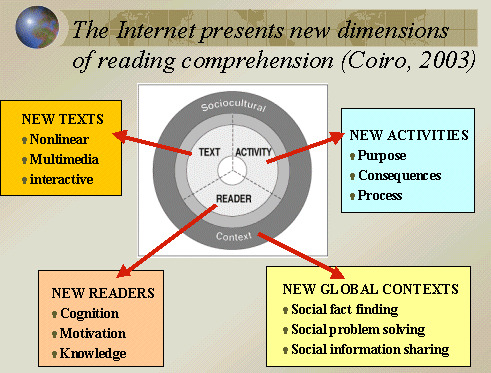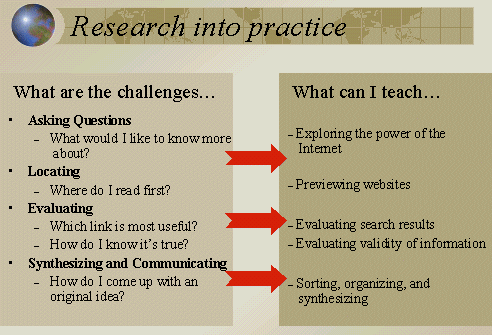The Internet is a powerful and complex reading environment
with
the potential to support and engage our weakest readers while also
challenging even our most skilled readers. How can this be?
This session is intended to introduce both aspects of Internet reading
to you and explain how to effectively read on the Internet with all
students.
Literacy Through The Ages
Literacy is always defined by the forms and functions of the
cultural
contexts
in which they emerge. Historically, you can see how literacy has
changed
and evolved, becoming more complex and globally defined. More recently,
the changes between one technology and the next occurs quite
rapidly. Each new technology causes us to broaden our
understanding of the rapidly changing reading, writing, and
communication strategies that will be required to succeed in the
future.
The Internet presents new dimensions of reading comprehension
It is my belief that important
questions about reading
comprehension on the Internet need to be addressed if we are to
effectively prepare students for their literacy futures. In this
context, four questions become important:
- Is the comprehension process different on the
Internet?
- If so, what new thought processes are required beyond
those
needed to comprehend conventional print?
- Are these processes extensions of traditional
comprehension
skills or do Web-based learning environments demand fundamentally
different skills?
- If comprehension is different on the Internet, what
implications do these differences have for comprehension instruction,
assessment and professional development?
The image below expands the center RAND Heuristic of Reading
Comprehension to include different elements of texts, activities,
readers, and contexts specifically related to the new
literacies required to use and learn from the Internet and other ICT.
For more information, see:
Coiro, J. (2003). Reading on the Internet: Expanding our
Understanding of Reading Comprehension to Encompass New
Literacies. The Reading Teacher, 56, 458-464.
Available online at http://www.readingonline.org/electronic/elec_index.asp?HREF=rt/2-03_column/index.html
| The Internet presents unique
possibilities to support and engage all readers. |
A. Internet texts can support learning while
adjusting for differences in reading ability, language, and/or learning
style.
- Internet text is nonlinear (reader has ultimate control
of
direction and meaning)
- Internet texts include multiple media forms that support
a
range of learning styles
- Internet text can be translated into multiple languages
- Internet text is interactive (active engagement
required, new
expectations to inspire learners)
B. The Internet provides a range of
resources
that support learning while adjusting for differences in reading
ability, vision, language, or
learning style.
- Online supports for viewing, interacting with, or
constructing
visual aids that foster comprehension and personal
meaning-making. These supports force us to question the labels
many students have been given.
- Reading, writing, and
communicating in the language arts
- Reading, writing, and
communicating across the content areas
C. Internet
texts
can engage disenchanted readers in challenging learning
experiences that foster authentic purposes for reading, writing, and
communicating.
D. Internet
reading
promotes the self-efficacy of diverse learners.
- Internet activities recognize the intellectual capital
that
each learner brings to the learning community
- Interent reading fosters identities as readers and
writers
- Internet reading invites social collaboration and the
ability
to work in groups across networks, languages, and cultures
| Ironically, the Internet also
presents complex
skills and strategies that challenge even our most skilled readers.
|
"The new literacies of the Internet
include the skills, strategies, and
dispositions
necessary to successfully use and adapt to the rapidly changing
information
and communication technologies and contexts that continuously emerge in
our
world and influence all areas of our personal and professional lives.
These
new literacies allow us to use the Internet and other ICT to identify important
problems, locate information,
evaluate the usefulness of
that
information, synthesize information
to
solve problems, and communicate the
solutions
to
others."
Read complete article at:
Leu, D.J., Jr., Kinzer, C.K., Coiro, J., Cammack, D. (2004). Toward a
theory of new literacies emerging from the Internet and other
information and communication technologies. [Article reprinted from
R.B. Ruddell & N. Unrau (Eds.), Theoretical Models and Processes of
Reading, Fifth Edition (1568-1611). International Reading
Association: Newark, DE.] [Online Serial]. Available: http://www.readingonline.org/newliteracies/lit_index.asp?HREF=/newliteracies/leu
| What are some examples of the
challenges that all Internet readers face and what can we teach to
address these questions? |
© Julie Coiro (2005)
DOWNLOAD THE HANDOUTS [pdf] THAT ACCOMPANY THE
LESSONS BELOW

Challenge:
GENERATING QUESTIONS -
What would I like to know
more about?
Learning Objective:
Exploring the power of the Internet
|
See
page 4 of handouts for activity template
- I wonder...
- Let's explore a few places to learn more...
- Model search engines use and citing sources
- Model summarizing, synthesizing, and evaluating
- Generate a new source of information to share with others
|
Challenge:
LOCATING INFORMATION -
Where do I read first?
Learning Objective:
Previewing websites
|
See
page 5 of handouts for activity template
- STOP AND THINK
- Preview left menu and top menu bar
- Anticipate where each link will lead
- Anticipate
multiple levels (closer or further)
- Explore interactive mouseover functions
- Note the author/webmaster/sponsor
- Understand unique website search features
|
Challenge:
EVALUATING INFORMATION-
Which link is most useful?
Learning Objective:
Evaluating search results
|
See
page 6 of handouts for activity template
- What clues to the words after the link give me?
- Are the results in any special order?
- Who sponsors the site?
- What's missing from this list?
- How do you know? and Why does it matter?
|
Challenge:
EVALUATING INFORMATION-
How do I know it's true?
Learning Objective:
Evaluating the validity of information
|
See
page 7 of handouts for activity template
- Does this
sound like it makes sense?
- Where else can I look?
- Who created the website and for what purpose?
- Who IS the author?
- Who is linking to this site? (LINK:URL)
|
Challenge:
SYNTHESIZING &
COMMUNICATING INFORMATION -
How do I come up with an
original synthesis?
Learning Objective:
Sorting, organizing, and synthesizing
|
See
page 7 of handouts for activity template
- Expect to
search in more than one place for different pieces of the information
- Generate synonyms to locate related information
- Expect to read on more than one website
- Develop an electronic system for sorting and organizing
information and sources
- Expect to construct an original response
|
| So, where do we go from
here??? |
How might we begin to support high AND low-achieving
students as they learn in complex online reading environments?
Since we know that...
- Students with high
interest are more likely to apply deep processing strategies to
complex reading tasks (Guthrie & Wigfield, 2005)
- Prior knowledge
is an important predictor of comprehension success (e.g., Pearson,
2005)
- Motivated students are likely to read more often and more widely
across other domains (Guthrie & Wigfield, 2005)
I'd like to propose a model that suggests...
- Effective learning environments for supporting
challenged readers as they learn new online comprehension strategies
should:
- Recognize individual strengths and abilities
- Emerge from personal interests and meaningful
problem-solving tasks that incorporate the use of new information and
communication technologies
- Relate to familiar topics initially to build on
individual strengths
- Gradually expand to other domains and more
challenging online texts
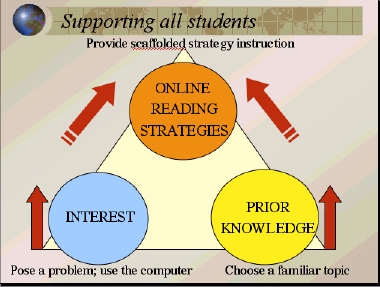
©
Julie Coiro, 2005
- Less skilled readers will become more engaged;
- More skilled readers will continue to be challenged;
- All students will develop the high-level comprehension
strategies that are critical in today’s digital information world AND
these strategies may very well transfer back to more traditional
reading contexts.
In review...
- The Internet requires us to broaden our current
perspectives of reading comprehension.
- The Internet has the potential to foster higher level
reading comprehension and engagement.
- The Internet presents new challenges to the reading
process and the reading curriculum
- A model of online comprehension strategy instruction
that builds off student interests and prior knowledge may indeed
support all students as they read, respond, and construct new ideas on
the Internet.
